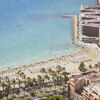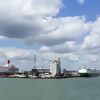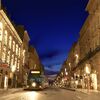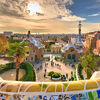14 Nights | CHATEAUX & SAINTS
You will visit the following 12 places:

Bilbao
Bilbao is a municipality and city in Spain, a major city in the province of Biscay in the autonomous community of the Basque Country. It is the main urban area in what is defined as the Greater Basque region. Situated in the north-central part of Spain, its main urban core is surrounded by two small mountain ranges. After its foundation in the early 14th century by Diego López V de Haro, head of the powerful Haro family, the city was a commercial hub of the Basque Country that enjoyed significant importance in Green Spain. This was due to its port activity based on the export of iron extracted from the Biscayan quarries. Throughout the nineteenth century and the beginning of the twentieth, Bilbao experienced heavy industrialisation, making it the centre of the second-most industrialised region of Spain. Today, Bilbao is a vigorous service city that is experiencing an ongoing social, economic, and aesthetic revitalisation process, started by the iconic Bilbao Guggenheim Museum, and continued by infrastructure investments, such as the airport terminal, the rapid transit system, the tram line, the Alhóndiga, and the currently under development Abandoibarra and Zorrozaurre renewal projects. Bilbao is also home to football club Athletic Club de Bilbao, a significant symbol for Basque nationalism due to its promotion of Basque players and one of the most successful clubs in Spanish football history.

Alicante
Alicante is a port city on Spain’s southeastern Costa Blanca, and the capital of the Alicante province. The area around Alicante has been inhabited for over 7000 years. The first tribes of hunter gatherers moved down gradually from Central Europe between 5000 and 3000 BC. Some of the earliest settlements were made on the slopes of Mount Benacantil. By 1000 BC Greek and Phoenician traders had begun to visit the eastern coast of Spain, establishing small trading ports and introducing the native Iberian tribes to the alphabet, iron and the pottery wheel. By the 3rd century BC, the rival armies of Carthage and Rome began to invade and fight for control of the Iberian Peninsula. The Carthaginian general Hamilcar Barcaestablished the fortified settlement of Akra Leuka (meaning "White Mountain" or "White Point"), where Alicante stands today. The city is popular for its stunning beach views, nightlife, hotel resorts and festivals.

Southampton
Southampton is the largest city in the county of Hampshire on the south coast of England, and is situated 120 kilometres (75 mi) south-west of London and 30 kilometres (19 mi) north-west of Portsmouth. Southampton is a major port and the closest city to the New Forest. It lies at the northernmost point of Southampton Water at the confluence of the River Test and River Itchen, with the River Hamble joining to the south of the urban area. The local authority is Southampton City Council, which is a unitary authority. Just over a quarter of the jobs available in the city are in the health and education sector. A further 19 per cent are property and other business and the third largest sector is wholesale and retail, which accounts for 16.2 percent. Between 1995 and 2004, the number of jobs in Southampton has increased by 18.5 per cent. Southampton has always been a port, and the docks have long been a major employer in the city. In particular, it is a port for cruise ships; its heyday was the first half of the 20th century, and in particular the inter-war years, when it handled almost half the passenger traffic of the UK. Today it remains home to luxury cruise ships, as well as being the largest freight port on the Channel coast and fourth largest UK port by tonnage, with several container terminals. Unlike some other ports, such as Liverpool, London, and Bristol, where industry and docks have largely moved out of the city centres leaving room for redevelopment, Southampton retains much of its inner-city industry.

Lisbon
The capital of Portugal, Lisbon (Portuguese: Lisboa) has experienced a renaissance in recent years, with a contemporary culture that is alive and thriving and making its mark in today's Europe. Perched on the edge of the Atlantic Ocean, Lisbon is one of the rare Western European cities that faces the ocean and uses water as an element that defines the city. Lisbon enchants travellers with its white-bleached limestone buildings, intimate alleyways, and an easy-going charm that makes it a popular year-round destination.

Bordeaux
Bordeaux is a port city on the Garonne River in southwest France, with an estimated (2008) population of 250,082. The Bordeaux-Arcachon-Libourne metropolitan area, has a population of 1,010,000 and constitutes the sixth-largest urban area in France. It is the capital of the Aquitaine region, as well as the prefecture of the Gironde department. Its inhabitants are called Bordelais. Bordeaux is the world's major wine industry capital. It is home to the world's main wine fair, Vinexpo, while the wine economy in the metro area moves 14.5 billion euros each year. Bordeaux wine has been produced in the region since the eighth century. The historic part of the city is on the UNESCO World Heritage List as "an outstanding urban and architectural ensemble" of the 18th century.

Barcelona
Barcelona – Spain's enchanting capital, second largest and most populous city. It is a huge city that vibrates with life, and there’s certainly not another city in the country to touch it for its sheer style, looks or energy. It is one of the world's leading tourist, economic, trade fair and cultural centers, and its influence in commerce, education, entertainment, media, fashion, science, and the arts all contribute to its status as one of the world's major global cities. Barcelona is home to masterpieces of many great architects – the most famous of which is Antoni Gaudí.

La Rochelle

Guernsey

Cadiz

Brest

Motril
Motril is a town and municipality on the Mediterranean coast in the province of Granada, Spain. It is the second largest town in the province, with a population of 61,171 as of 2012. Motril is a growing dynamic city, a place of service where visitors feel at home, thanks to the great hospitality of its people. You can visit many places to have fun and meet new people. It also belongs to the Costa Tropical, a large region of the coast is very famous and touristic. Motril beaches can be small (bays) or large (like Playa Granada). The weather is usually good, so they are very popular during the summer by people from the surrounding as well as the interior regions.










